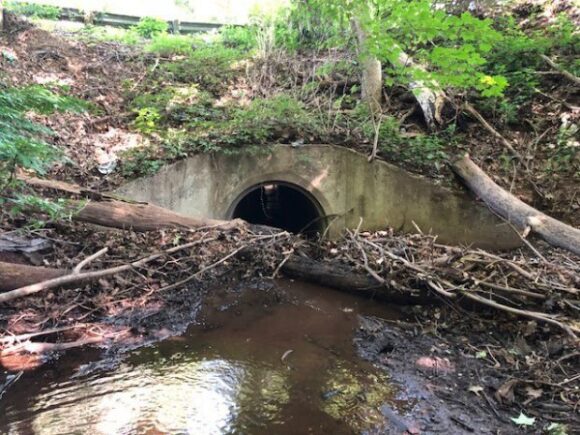Helping guide investments in climate resilience that also benefit ecosystem health is smart public policy. Rutgers Sustainable Raritan River Initiative is partnering with the New York-New Jersey Harbor and Estuary Program (HEP) to undertake an “Aquatic Connectivity Through Climate-Ready Infrastructure” project on the Lower Raritan River watershed. The project seeks to improve road-stream crossings at bridges and culverts so that they are better able to pass fish and other aquatic life and address hydraulic capacity issues that lead to roadside flooding and erosion. Increases in intense rainfall events make this a growing concern for municipal government and transportation agencies.
This project is being supported by a 2020 National Estuary Program Coastal Watershed Grant awarded to the HEP-Rutgers team. This nationally-competitive grant program, funded by EPA and administered by Restore America’s Estuaries, is designed to support projects that address urgent and challenging issues threatening the well-being of coastal and estuarine areas. The winning proposal will enable HEP and the Rutgers Raritan River Initiative to prioritize restoration projects in the lower Raritan River watersheds and provide guidance on where stakeholders can take action to both increase aquatic habitat connectivity and address coastal flooding issues.
Isabelle Stinnette, HEP’s principal investigator for this “Aquatic Connectivity Through Climate-Ready Infrastructure” project, was a partner with Thomas Grothues, Department of Marine and Coastal Sciences, Rutgers’ School of Environmental and Biological Sciences, on a 2019 Rutgers Raritan River Consortium mini-grant that developed recommendations for barrier removal in one subwatershed of the Lower Raritan River. The National Estuary Program Coastal Watershed Grant continues and expands this effort to eleven subwatersheds in the Lower Raritan basin.
Stinnette stated, “This project satisfies many of HEP’s programmatic goals; by providing needed data, leading to increased aquatic habitat connectivity, potentially new funding streams for restoration, as well as supporting informed climate change preparedness. We are excited that this grant and partnership with Rutgers allows us to take this project to the next level to support New Jersey’s beautiful and threatened coastal habitat.”
Richard Lathrop, Jr, professor, Department of Ecology, Evolution, and Natural Resources at Rutgers’ School of Environmental and Biological Sciences, will coordinate the fieldwork and oversee the Rutgers graduate and undergraduate students conducting approximately 250 stream crossing/culvert assessments under the Coastal Watershed Grant.
“We see this project as a win-win: it will provide much-needed data on how to improve aquatic connectivity in the Lower Raritan watershed, as well as provide our students the opportunity to gain valuable field ecology training and experience,” noted Lathrop.
The Coastal Watershed Grant runs for two years with the culvert assessment fieldwork to be conducted in the summer and fall of 2021 and 2022. Final recommendations and reporting will be completed by December 2022.
The Sustainable Raritan River Initiative (SRRI) is a joint program of the Edward J. Bloustein School of Planning and Public Policy and the School of Environmental and Biological Sciences at Rutgers, The State University of New Jersey. The SRRI is part of Rutgers Raritan River Initiatives that also include the Rutgers Raritan River Consortium (R3C) and the Johnson Family Chair in Water Resources and Watershed Ecology. Together these initiatives engage and train the Raritan stewards of tomorrow and facilitate multidisciplinary research while expanding the university’s engagement with external partners. The initiatives also integrate Rutgers’ science and research into regional planning and decision making, while building partnership for a more sustainable Raritan River, Basin, and Bay.


